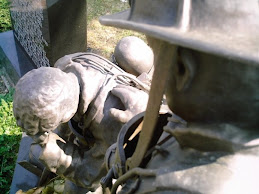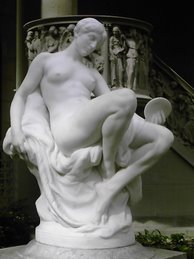I learned so much about how to interpret history just from reading Thomas Bowden’s book on Columbus and his multiculturalists critiques, those haters of all things Western Civilization, which I first picked up during my early years in Objectivism.
I learned how to evaluate an historical figure according to the context of his time, and by means of what is most historically essential and significant about such figures, to name just a couple of the most important lessons I culled from “The Enemies of Christopher Columbus.” I learned that just as there is an objective method of evaluating science, so, too, is there one for evaluating history — and, really, everything else.
Sure, buy this book if you’re interested in learning more about how to objectively evaluation the many unjust attacks against Columbus and his successors in the Americas — e.g. he didn’t really “discover” America, Europeans “stole” the land from the natives, Columbus and the Europeans were unprecedentedly brutal to the Indians — and why calling them “Native Americans” is a misnomer. But I recommended it even more as a great book to learn the method of thinking needed to objectively evaluate historical figures in general. In other words, it provides the opposite of what most people are taught from kindergarten to college.
Monday, October 11, 2010
Wednesday, October 6, 2010
Why Communists Have Largely Escaped Justice
By Joseph Kellard
While it's good to see that some mass murdering communists are finally being brought to (some) justice, the fact is that communism and its practitioners will continue to fade into history relatively unscathed. The author of this City Journal article makes a few good points, but he falls short on others.
He is right, for example, to point out that the Western media writes as if the Khmer Rouge regime in Cambodia was just some murderous gang that happened to be in power at the time, and not what they in fact were: a group ideologically driven by communism. (I recently pointed to a New York Times article and five-minute video on these Cambodian tribunals, both of which never used the words "communist" or “communism” to describe the Khmer Rouge.)
I think the author falls short, however, when describing why Communists have never been brought to justice until now. He writes that there are two reasons:
“First, Communism enjoys a kind of ideological immunity because it claims to be on the side of progress. Second, Communists remain in power in Beijing, Pyongyang, Hanoi, and Havana. And in areas where they've lost power--as in the former Soviet Union--the Communists arranged their own immunity by converting themselves into social democrats, businessmen, or nationalist leaders.”
His points are valid but not fundamental. He’s right that communism enjoys ideological immunity, but it’s not primarily because communists claimed to be on the side of progress. It’s because of the morality communist champion -- which is essentially a secularization of Christianity.
While Christians through the ages told men to sacrifice themselves to God and his self-appointed representatives on earth, the Communists told men to drop God and sacrifice for your fellow men, particularly the mother country and the state (their self-appointed representatives). Now, Nazism preached the same ideology, and that’s why the Nazi and Communist totalitarian regimes rose to power at the same time. But Nazism (which stands for National *Socialism,* with Germany as the homeland of socialism/communism) put an explicitly racial bent on their ideology, while the communists mainly championed the proletariat or social classes (although that’s not to say that communists were not tribalists-racists, too, they were).
Nazism is considered the greater evil, or unfortunately to many people the only evil, because it was explicitly racists, whereas, the believe, communism was merely trying to make society more “equal” between “the rich” and the poor. Nothing wrong with that, even if tens of millions had to be slaughtered in the process, right? Communism is noble in theory; it was just that the wrong people got in power and corrupted it.
That’s the standard line that you’ll hear from communism’s apologists. But the reality is communism was evil in practice because it is evil in theory — especially it’s altruistic morality that preaches self-sacrifice as the moral good.
This is what people like the author of this article must come to understand, otherwise communism will always be looked at as a non- or lesser evil in comparison to Nazism. In reality, they are ideological twins and their practice in reality led to the same results: mass murder (although communists slaughtered many, many more innocents).
While it's good to see that some mass murdering communists are finally being brought to (some) justice, the fact is that communism and its practitioners will continue to fade into history relatively unscathed. The author of this City Journal article makes a few good points, but he falls short on others.
He is right, for example, to point out that the Western media writes as if the Khmer Rouge regime in Cambodia was just some murderous gang that happened to be in power at the time, and not what they in fact were: a group ideologically driven by communism. (I recently pointed to a New York Times article and five-minute video on these Cambodian tribunals, both of which never used the words "communist" or “communism” to describe the Khmer Rouge.)
I think the author falls short, however, when describing why Communists have never been brought to justice until now. He writes that there are two reasons:
“First, Communism enjoys a kind of ideological immunity because it claims to be on the side of progress. Second, Communists remain in power in Beijing, Pyongyang, Hanoi, and Havana. And in areas where they've lost power--as in the former Soviet Union--the Communists arranged their own immunity by converting themselves into social democrats, businessmen, or nationalist leaders.”
His points are valid but not fundamental. He’s right that communism enjoys ideological immunity, but it’s not primarily because communists claimed to be on the side of progress. It’s because of the morality communist champion -- which is essentially a secularization of Christianity.
While Christians through the ages told men to sacrifice themselves to God and his self-appointed representatives on earth, the Communists told men to drop God and sacrifice for your fellow men, particularly the mother country and the state (their self-appointed representatives). Now, Nazism preached the same ideology, and that’s why the Nazi and Communist totalitarian regimes rose to power at the same time. But Nazism (which stands for National *Socialism,* with Germany as the homeland of socialism/communism) put an explicitly racial bent on their ideology, while the communists mainly championed the proletariat or social classes (although that’s not to say that communists were not tribalists-racists, too, they were).
Nazism is considered the greater evil, or unfortunately to many people the only evil, because it was explicitly racists, whereas, the believe, communism was merely trying to make society more “equal” between “the rich” and the poor. Nothing wrong with that, even if tens of millions had to be slaughtered in the process, right? Communism is noble in theory; it was just that the wrong people got in power and corrupted it.
That’s the standard line that you’ll hear from communism’s apologists. But the reality is communism was evil in practice because it is evil in theory — especially it’s altruistic morality that preaches self-sacrifice as the moral good.
This is what people like the author of this article must come to understand, otherwise communism will always be looked at as a non- or lesser evil in comparison to Nazism. In reality, they are ideological twins and their practice in reality led to the same results: mass murder (although communists slaughtered many, many more innocents).
Subscribe to:
Posts (Atom)































+-+June+2009.jpg)










